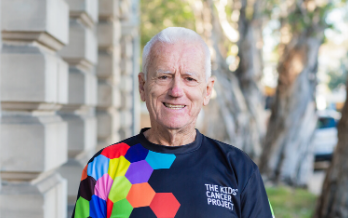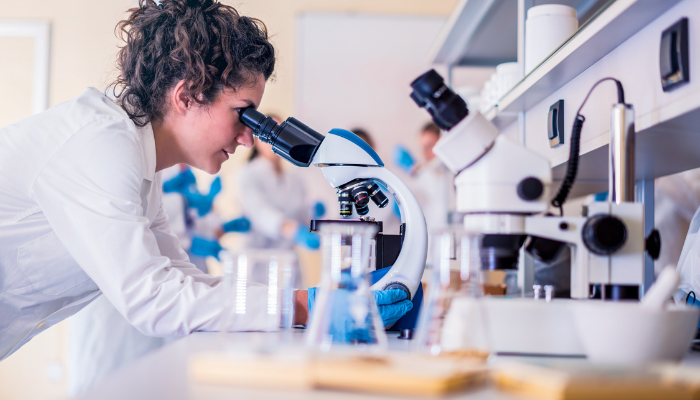Col Reynolds Fellow, Dr Noa Lamm-Shalem

Recipient: Dr Noa Lamm-Shalem
Institute: Children’s Medical Research Institute
Funding: $621,870.00
Dr Noa Lamm-Shalem is Head of the Nuclear Dynamics Group at the Children’s Medical Research Institute and a lecturer at the University of Sydney. She obtained her Bachelor of Science in Biology and Psychology from the Hebrew University in Jerusalem. There, she pursued her Masters and PhD in the Genetics Department. During her PhD, she studied dyskeratosis congenita, a rare genetic disorder characterised by severe bone marrow failure and increased cancer risk, identified new disease-related mutations and revealed a novel disease-causing mechanism. Her research investigates the impact of DNA replication stress on genome integrity and its implications for cancer development.
Motivation
My motivation is deeply rooted in my family history, which was profoundly impacted by the devastating effects of inherited breast cancer. During my childhood, I lost my mother to this relentless disease. She was only 32 when diagnosed, but she had felt a lump a year before that. Unfortunately, her doctor reassured her that breast cancer doesn't strike at such a young age, leading to delayed diagnosis and treatment. Despite her courageous battle, she passed away at the age of 40, just like my grandmother before her.
In 1990, a pivotal moment in medical history occurred when researcher Mary-Claire King published a groundbreaking paper in Science, identifying the BRCA1 gene as a cause of breast cancer. This discovery was followed by Michael Stratton's finding of another cancer gene, BRCA2, which also contributed to breast and ovarian cancer. At the time, my mother and grandmother were unaware that they carried these genes, but now, thanks to advances in genetic testing, other females in our family have been informed about our genetic predisposition. This knowledge opens up opportunities for early detection and even prevention, giving us a chance to fight back against this merciless disease.
This revelation sparked within me a profound appreciation for the significance of basic science and how it can profoundly impact lives, including my own. From a relatively young age, I knew that my life's calling was to pursue a career in research, with a particular focus on cancer research. I am driven by the desire to contribute to the ongoing efforts to understand, combat, and ultimately defeat cancer. I hope to make a meaningful difference and honour the memory of my mother and grandmother by helping others facing similar challenges.
Researching Drug Resistance
Childhood cancers currently undergo treatment through a combination of surgical interventions, chemotherapy, and radiation. Despite significant advancements in scientific research, which have yielded numerous drugs to enhance the effectiveness of cancer therapies tailored to specific types, a persistent and daunting challenge remains: the emergence of drug resistance in many patients. Referred to as drug resistance, this phenomenon stands as one of the most formidable obstacles confronting both cancer researchers and patients today. Understanding and combating therapy resistance have become critical objectives in the pursuit of improved cancer treatments.
My research endeavours to address this pressing problem by delving into the mechanisms responsible for therapy resistance. More precisely, my focus centres on the AKT oncogene, which plays a crucial role in the progression of various childhood cancers, including acute lymphoblastic leukaemia, neuroblastoma, and Ewing sarcoma. Activated AKT has been closely associated with resistance to both chemotherapy and radiotherapy, leading to unfavourable prognoses.
My team and I are dedicated to comprehending how AKT contributes to therapy resistance and are actively seeking to identify new, selective AKT inhibitors. Through targeted inhibition of the AKT pathway, we aim to sensitize cancer cells to other treatment modalities, reduce adverse effects, and ultimately enhance survival rates for children afflicted with cancer. By shedding light on this crucial aspect of cancer research, we hope to pave the way for more effective and compassionate treatments, offering renewed hope to young cancer patients and their families.
Focus on AKT oncogene
My research is focused on therapy resistance driven by the AKT oncogene, which plays a crucial role in various types of childhood cancers including acute lymphoblastic leukaemia, neuroblastoma, and Ewing sarcoma.
To conduct our experiments, we predominantly use an osteosarcoma model due to technical considerations. Osteosarcoma is the most prevalent form of bone cancer in children and typically originates in the rapidly growing ends of long bones in the arms and legs. Common locations for the tumour include the lower end of the thigh bone, the upper end of the shin bone, and the upper end of the long bone in the upper arm.
Despite the availability of multimodal treatments involving surgery and chemotherapy, the clinical results for osteosarcoma patients remain unsatisfactory. The primary cause of these suboptimal outcomes is the development of resistance to various chemotherapies.
Nevertheless, we are optimistic that our research findings will have broader implications beyond osteosarcoma and will be relevant to other types of AKT-driven childhood cancers. By gaining insights into the underlying mechanisms of therapy resistance, we hope to contribute to the development of more effective and targeted treatment strategies for these devastating diseases.
Novel Inhibitors to Stop AKT
AKT, a critical signalling pathway responsible for promoting cell growth and survival, plays a central role in several childhood cancers due to its dysregulation. As a result, AKT inhibitors have emerged as promising candidates for cancer treatment since the 1990s. However, the currently available pan-AKT inhibitors come with significant limitations, including adverse effects and toxicity. To address these concerns, there is an urgent need for novel inhibitors that specifically target AKT's oncogenic activities.
Through our proposed study, I anticipate identifying a novel class of pharmacological targets capable of directly intervening with AKT's oncogenic activities. By doing so, we aim to develop safe and effective treatment strategies that can improve outcomes for children with cancer.
This research is a crucial link that bridges the gap between basic research discoveries and industry partnerships for drug development. The exciting findings we expect to uncover have the potential to transform into tangible translational outcomes.
With confidence in the potential impact of our work, I envision a future where these discoveries pave the way for better treatments, offering hope and a brighter future for young cancer patients.
Leading to safer treatments
Our team operates at the intersection of fundamental and applied research, harnessing the strengths of both to drive a swift translation of our discoveries into safer and more efficacious therapies. With a keen focus on basic science, we aim to unlock valuable insights into the mechanisms underlying therapy resistance in childhood cancers. Addressing this critical gap is vital, as it represents a significant unmet need for children worldwide.
Through my proposal, we seek to expand our understanding of the specific pathways leading to therapy resistance and, in turn, identify novel therapeutic targets to prevent it. This pursuit carries the potential to be a game-changer for children battling cancer, offering them more precise and effective treatment options. In particular, we are excited about the discovery of new AKT inhibitors, which could revolutionize outcomes for young patients.
Our preliminary investigations have already yielded promising results, suggesting that selective inhibition of the AKT pathway can sensitize cancer cells to other treatments while minimizing adverse effects. By doing so, we aspire to significantly improve survival rates and quality of life for children undergoing cancer treatment.
Col Reynolds Fellowship
Being selected for the prestigious Col Reynolds Research Fellowship is an extraordinary honour and a significant milestone, especially for a young lab head like me, who has recently established an independent research lab. This Fellowship represents a tremendous opportunity, providing vital financial resources and recognition that would empower me to embark on independent and hopefully groundbreaking research in the field of childhood cancer. It also serves as a validation of my dedication and passion for addressing the most critical challenges in paediatric oncology.
Professionally, this Fellowship offers an unparalleled chance to collaborate with leading experts in the field and access to state-of-the-art technology and advanced facilities that would enhance the quality and scope of my research endeavours. Moreover, this Fellowship provided me the opportunity to attend conferences and workshops that would further enrich my expertise and knowledge in the domain of childhood cancer research.
Thank you, donors!
To the generous and compassionate community of donors supporting The Kids' Cancer Project, I want to express my heartfelt gratitude for your unwavering dedication and commitment to funding childhood cancer research.
As a researcher in the field of childhood cancer, I am deeply aware of the significance of your support. Without your generosity, research projects like mine would remain unattainable, hindering progress toward better treatments and outcomes for young cancer patients.
Receiving the Col Reynolds Research Fellowship would not only elevate my career but also fuel my determination to make a meaningful and lasting impact in the fight against childhood cancer. I am deeply grateful for this opportunity and look forward to utilizing the resources and support provided by the Fellowship to advance the field of paediatric oncology and contribute to the well-being of young cancer patients.
Each step we take towards unravelling the complexities of childhood cancer might transform the lives of these brave children and their families.
Yes, there is something important I would like to add: The journey to find a cure for childhood cancer is not an easy one, and it requires continuous dedication, perseverance, and resources. The Kids’ Cancer Project’s commitment to supporting research plays a pivotal role in advancing the field of paediatric oncology. Your generosity not only funds research but also offers hope to young patients and their families, reminding them that they are not alone in their battle against this devastating disease.
Find out more about the Col Reynolds Fellowship
With an investment of over $7.6 million, The Kids’ Cancer Project is ensuring that some of the best and brightest young researchers in Australia can further their careers and most importantly, their impact on childhood cancer research.


Read more from past recipients
From a field of outstanding candidates across Australia, The Kids’ Cancer Project has funded the next generation of childhood cancer researchers. Their science-backed research is sure to deliver breakthroughs across a range of areas relating to childhood cancer.

